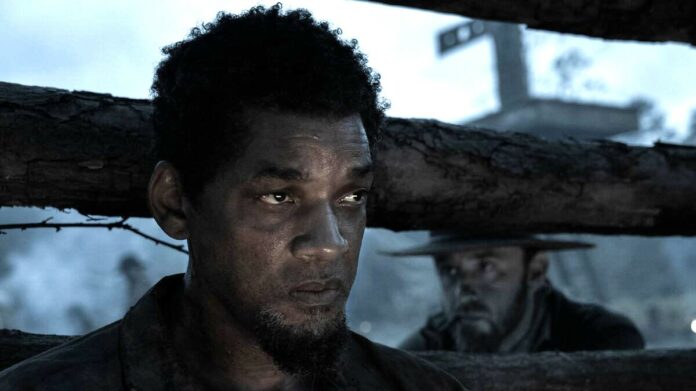Comparing and contrasting the posters of 2012’s Lincoln and 2022’s Emancipation is interesting. Ten years apart, both of these movies have the same basic structure in aesthetic and protagonist placement to the extent that it is almost impossible to ignore. It is also hilarious and, perhaps, evident because of its hilarity that the story takes place almost immediately after Lincoln announces, on January 1, 1863, the decision to end slavery or the abolitionist movement. While the United States, and thus the Union army, follows that to the letter, events deep down in the South tell a different story.
Emancipation follows the story of Gordon (named Peter in the movie), who decides to escape from a slave camp by building railway tracks and travels through the treacherous swamps of Louisiana towards Baton Rouge to join the Union Army. He effectively takes freedom into his own hands. In concept, this is a tried and tested idea, albeit an idea so obviously obvious it’s almost groan-inducing because the concept of a slavery epic as an awards contender or a slavery epic as a film of “weight” or “grave importance” is now almost open to criticism. It plays into expectations of movies being monolithic representations of different racial or religious groups (a Holocaust story for Jews, a slavery epic for African Americans, a Bollywood-style epic musical for Indians). The big issue with Emancipation here is what it is striving to be and what it actually has to be. Antoine Fuqua is a director known for creating hard-hitting action films with elements of drama and social messaging interwoven into the plotting. His entire filmography and his style of filmmaking (drone shots, long tracking shots) lend very well to the gruesome action films he wants to create. Emancipation, to a certain degree, follows that template of an action movie, down to the story just jumping into the survival thriller aspect of the plot as Smith’s Peter runs, lumbers, hacks through, and guides a canoe through the swamps of Louisiana, battling an alligator with a knife for good measure. These are all pulpy, visceral elements. It is also emblematic of a movie not considered “important.”
It’s a problem because the material itself is hard-hitting and powerful. The story of one of the most famous unknown slaves, whose “whipped back” photo became one of the most circulated photos as a representation of the abolitionist movement, is fertile ground for historically and sociologically profound storytelling. Unfortunately, profundity comes in the form of desaturated cinematography, lending the film an eerie dream-like quality in certain sequences and a garish bleakness in others. But these drone shots or moments of supposed gorgeous images (gunpowder smoke covering an area of the plantation as Peter runs away) do not serve to introduce any form of character depth beyond the surface. Smith’s Peter is hunched but not completely wobbled over; a man determined to stand and face his captors, a feature which would have impressed the audience had Peter not repeated the sentiment to one of his fellow captors. Similarly, Ben Foster’s Fassel is a dark, brooding, and yet over-the-top slave-catcher who proclaims in no uncertain terms that “he is God” for these slaves. Subtlety is not Fuqua’s or screenwriter William N. Collage’s forte.
But Hollywood summer blockbuster action movies are supposed to be Fuqua’s forte. It’s a shame, then, that the 10-day trek through the Louisiana swamp couldn’t be visualized by Fuqua with the thrill and visceral expressiveness befitting an action or survival movie. The momentum sags, especially in the second half, as Peter’s trials and tribulations become repetitive, and the bloat becomes noticeable. By the time Peter finally catches up with the Union Army, the action movie should be ending with the credits beginning to roll, except there are an additional thirty minutes where he joins the Union Army. Mustafa Shakir’s Andre Callioux helps him acclimate within the army. The two white photographers managed to click the famous picture which would become the face of the abolitionist movement. Then, Peter would become a part of the army, learn how to be a capable soldier, and free the plantation from whence he escaped. The disparity in momentum between the entire second act and the third act is especially jarring because the hagiographical telling of the final thirty minutes makes Emancipation feel the most like a biopic.
In a vacuum, the action sequences are well done. The movie itself feels artfully constructed, and Will Smith delivers a very committed performance, bordering on downright impressive at specific segments. Perhaps because his character is not required to interact for a majority of the runtime, Smith’s inability to fake a natural accent isn’t noticeable here. The important material allows him to drop his voice to a lower octave, giving it far greater gravitas. Perhaps this is the movie for which the golden statue should have been awarded to Smith. This definitely feels like a movie in which Apple was right not to move to 2023, despite the controversy surrounding Smith during the 2022 Oscars. As far as the film is concerned, perhaps it is all moot, which is a shame because Smith genuinely tries to give a gravitas-laden performance here, even though his character is ultimately hollow and devoid of much interiority. The image of Peter being dragged from his family and him pulling the wooden frames from the door in an attempt to rush back is still the most powerful image in a movie supposed to evoke “important” imagery.

